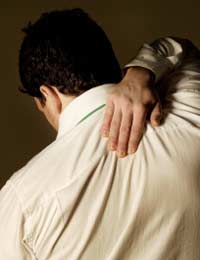About Chronic Muscle Stiffness

What is Chronic Muscle Stiffness?
Chronic Muscle Stiffness is another term used to describe Fibromyalgia; however the condition is often misdiagnosed as Chronic Muscle Stiffness if the sufferer does not appear to have any of the other symptoms associated with Fibromyalgia.Sufferers of Chronic Muscle Stiffness can often find that they have difficulty walking or straightening up after being in the seated position for a period of time.
It is a problem which generally affects women in the late thirties to late fifties although in recent years an increasing number of men have been diagnosed as suffering from the condition.
What are the Symptoms of Chronic Muscle Stiffness?
Chronic Muscle Stiffness not only involves pains in the muscles and ligaments of the sufferer but also can manifest itself with:- Headaches
- Fatigue
- Pins and Needles
- Pelvic Discomfort
- Inflammation of the Joints
The aforementioned symptoms may manifest themselves in clusters depending on the sufferer or they can be experience en masse as it were depending on the level of chronic discomfort.
How to Cope with Chronic Muscle Stiffness?
Just like Fibromyalgia Chronic Muscle Stiffness can come and go and there are times when the sufferer will experience what are described as ‘flare-ups’. These ‘flare-ups’ can sometimes be days or weeks apart or in severe cases can continue unabated for lengthy periods of time.As there is no known cure for this problem – and neither is there a cure for Fibromyalgia – the sufferer may find that they have to cope as best they can and consult their doctor for pain relief and anti-inflammatory medication.
The condition can be a very stressful one especially if the sufferer has been particularly active in their work and social life and this too can be difficult to deal with. The problem itself may lead to bouts of depression during which time the sufferer may feel that they are no longer in charge of their body and can feel as though they are being cut off from those around them.
It is important to try and cope as best you can with such illness and many sufferers keep a diary or journal detailing their symptoms and how they have went about their daily routines. This information is useful not only as a means of coping with the condition but as a means of providing their doctor with as much information as possible when in consultation.
Treating Chronic Muscle Stiffness
As we have already mentioned it is difficult to treat this condition along with Fibromyalgia, the illness which so often accompanies Chronic Muscle Stiffness. Your doctor may prescribe a course of anti-inflammatory medication to try and relieve inflammation and tenderness around the joints although he or she may only do this for a short period of time to monitor their effectiveness. Anti-inflammatory drugs are monitored as prolonged use can – and does in certain cases – cause stomach ulcers and possible liver complications.In addition your doctor may suggest some light exercise which may involve simply sitting in a chair and flexing the arms and legs in order to keep the joints moving. You should do this but only to the point where the pain worsens. As soon as the pain becomes too much you should stop; never try to overdo it.
Hot baths are also a good way in which to relieve muscle pain; a hot bath can help muscles and ligaments relax and become less tense but again it is recommended that you consult with your doctor as these methods are only short term solutions to a much wider problem.
Further Information
Consult your doctor if the problem persists as it may be the pre-cursor to something more serious such as Fibromyalgia itself. Many people mistake the condition for fatigue or overworking and it is important to seek medical advice if the problem persists or worsens.Again where possible keep a diary or log of the problem listing how often and for how long it occurs; this will help your doctor to help you.


Re: Numbness and Tingling in Fibromyalgia Syndrome
I'm having numb and tingling on my right side of face from corner of mouth to high cheek bone...........…
Re: Benefits and Allowances for Fibromyalgia Sufferers
I have fibromyalgia I started with it at the age of 5 years old I got burnt by a chip at pat the age…
Re: Benefits and Allowances for Fibromyalgia Sufferers
Having read all the comments here. I’m very discouraged. I don’t think I’ll be putting myself through…
Re: Chronic Fatigue and Fibromyalgia
I have not been diagnosed with fibromyalgia as such. The doc thinks it is, I have been put on antidepressants. To quote him ,…
Re: Reading Aids and Fibromyalgia Syndrome
Eeeeer.
Re: Being a Parent With Fibromyalgia
I'm really struggling I have my 2 grandsons full-time or thy would of ended up in the system been 18 month now thy are now 2…
Re: Dealing With Fatigue Day by Day
Hi I've had FM for years now, I've always worked but now ive gotten so bad with pain increasing and being on max dose, i work…
Re: Benefits and Allowances for Fibromyalgia Sufferers
Over 20 years ago after mri blood test I was told I had fibromyalgia, I was working at the time until…
Re: Benefits and Allowances for Fibromyalgia Sufferers
I work part time and am a carer in receipt of carer's allowance for my hubby who is on state pension.…
Re: Fibromyalgia in Old Age
I don't know if I have fibromyalgia but 3 months ago I had a migraine which led to chronic neck ache. Now I have pain in various parts of…